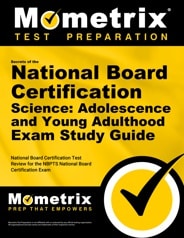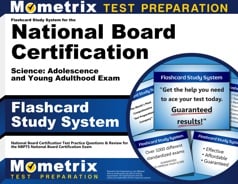The National Board for Professional Teaching Standards (NBPTS) Certification aims to develop, retain, and recognize accomplished educators while encouraging school improvement nationwide.
Here, we’re taking a look at the certification in Adolescence and Young Adulthood Science, which pertains to teaching children ages 14 to 18+.
Exam Eligibility
The basic eligibility guidelines to apply for this certification are:
- A bachelor’s degree
- A valid state teaching license
- Three years of classroom experience
Part-time and long-term substitution teaching counts toward the three-year employment requirement as long as you ALSO hold a valid state teaching license and the time computation follows those outlined in the eligibility guidelines.
NBPTS allows those who haven’t met the three-year experience requirement to begin the application process as long as they fulfill this requirement by the end of their application process.
Check Out Mometrix's National Board Certification Study Guide
Get practice questions, video tutorials, and detailed study lessons
Get Your Study Guide
Certification Components
The Adolescence and Young Adult Science certification consists of four components.
Components 2-4 are part of your portfolio that you submit online.
All four components are required for certification.
- Component 1: Content Knowledge. This is the computer-based assessment where you demonstrate your understanding of knowledge and pedagogical practices in your content area.
- Component 2: Differentiation in Instruction. This portfolio entry will include selected work samples that demonstrate student growth and a written commentary where you analyze your instructional choices.
- Component 3: Teaching Practice and Learning Environment. This portfolio entry requires video recordings of your classroom engagement and a written commentary describing, analyzing, and reflecting on your interactions.
- Component 4: Effective and Reflective Practitioner. This portfolio entry requires you to demonstrate your abilities to develop and apply knowledge of your students, your ability to use assessments to plan and impact student learning, and your collaborative efforts to advance student learning and growth.
The testing window for Component 1 ranges from the beginning of March to the middle of June. The submission window for your portfolio components goes from the beginning of April to the middle of May.
Details of Component 1: The Exam
Component 1 of the certification process is a computer-based assessment that measures your knowledge of the teaching content area and its appropriate teaching practices. You must demonstrate your knowledge in creating developmentally appropriate content that can be applied and adapted across the full age range and ability level of the certification you are applying for.
For the Adolescence and Young Adulthood Science certification, there are four specific content areas covered by the Content Knowledge exam: Biology, Chemistry, Earth/Space, and Physics. Upon registration, you will be asked to select your focus area of choice.
The computer-based assessment consists of 45 selected-response questions and three constructed response exercises. For Chemistry and Physics, you are given a total of 75 minutes to answer the selected-response portion, while Biology and Earth/Space will be given 60 minutes. After which, you will have 30 minutes for each constructed response question, with a 10-minute break between both portions of the exam.
Selected-Response Section
The selected-response questions cover the following content areas in the approximate percentages listed:
- Knowledge of Science Practices and Context (20%): Topics in this category include the nature of science, understanding of inquiry, and the context of science.
- Knowledge of Science Content (45% for specialty, 15% from other disciplines): Topics in this category include earth and space science, life science (biology), chemistry, and physics.
- Curriculum, Instruction, and Learning Environment (20%): Topics in this category include crosscutting principles, assessing and addressing preconceptions, and safety.
Constructed-Response Section
There are three exercises in the constructed-response section. You are allowed 30 minutes for each exercise, consisting of one or more prompts or questions.
A scenario or student profile is presented for you to consider when you answer the prompts relating to the information. Be sure to follow the directions in the prompt and answer only what is asked. The scoring assessors only evaluate your responses relating to the question or prompt. For example, if you are asked to provide two examples, do not provide three. You will waste valuable time, and the assessors will only evaluate the first two examples.
Your responses are judged on the depth and quality of your answers—grammar, punctuation, and organization are essential.
In this exercise, you will use your knowledge of science to read a description of a student-designed experiment, study a student’s collection of data, and analyze a student’s conclusion concerning the experiment. You will be asked to respond to one prompt.
Exercise 2: Contexts of Science
In this exercise, you will use your knowledge of science to describe a scientific event or discovery and discuss the scientific knowledge needed to understand the event or discovery, explain how another science discipline is related to the event or discovery, and describe how the event or discovery has affected society. You will be asked to respond to one prompt.
Exercise 3: Development of Scientific Concepts
In this exercise, you will demonstrate your knowledge of scientific conceptual development by evaluating and describing a student’s conceptual understanding of scientific concepts, and by describing instruction that would help move the student toward the accepted understanding of the scientific concept. You will be asked to respond to one prompt.
Exam Registration
Register for an account using the National Board Candidate Management System (NBCMS) to begin the certification process and purchase components. There is a $75 registration fee for every cycle year that must be paid before you can purchase a component.
Once you have registered, make sure to take note of the deadlines for registration, taking an exam, and submitting the requirements and portfolios. These deadlines vary yearly but generally, registration and component selection is open from July to February of the following year. The testing window for Component 1 is from March to June, portfolio submission is from April to mid-May, and the release of scores will be in December.
Fees
The fee to take each component costs $475, making the total cost of the certification process $1,900. You can pay for the full fee in one go or spread out the payment over the three years of application. Keep in mind that you need to pay the additional $75 registration fee to maintain your online account.
NBPTS offers a payment plan that divides the cost of your certification over six equal payments, and financial aid may be available from your state or district.
Scheduling the Component 1 Assessment
Once registration for Component 1 is done, you will receive an email notification to schedule an exam appointment on the affiliated Pearson VUE website. The website also provides a tutorial experience to help prepare yourself better for the exam.
Test Day
Be sure to arrive 30 minutes before the start of the assessment. If you arrive more than 30 minutes after your scheduled exam time has started, you will not be allowed to enter the test venue.
You must bring a valid government-issued identification card that contains your photo, signature, and a name that matches the name you used when applying for the exam.
Before the exam begins, you will be required to sign a Non-Disclosure Agreement to maintain the integrity of the exam. You will then be provided a test booklet and pencils for the constructed response portion. An online scientific calculator on your computer will be available during the exam.
How the Exam is Scored
For Component 1, selected-response questions answered correctly will be given one point. Your total raw score will be converted to a rubric score scale from 0 to 4.25. For the constructed-response questions (as well as Components 2, 3, and 4), your score will be assessed using a 12-point rubric score scale that ranges from 0.75 to 4.25.
To achieve certification, you must achieve a score of 2.75 on all components, signifying clear evidence of accomplished teaching practice. The absolute minimum average scores you can achieve for all components are 1.75, with a total weighted scaled score of at least 110. However, these latter scores do not guarantee an NBPTS certification compared to achieving the earlier score of 2.75.
If you pass all components, you will be eligible for board certification. Make sure to keep in touch with the NBPTS and update any contact information on your NBPTS account so they can communicate important information with you.
Retaking the Exam
If you fail to achieve a passing score on any of the components, you are allowed to retake each of them up to two times within two years.
Check Out Mometrix's National Board Certification Flashcards
Get complex subjects broken down into easily understandable concepts
Get Your Flashcards
Preparing for the National Board Certification
National Board Certification adds weight to your experience. The certification sets you apart from other educators who have not received certification. The assessment makes up 40% of your overall score, so it is important that you do well on the exam. The lengthy and intense process requires you to be dedicated to every step.
Our National Board Certification: Science (Adolescence and Young Adult) study guide and flashcards help direct your studying, so the time you spend is effective, resulting in a higher score!
FAQs
Q
What is the National Board Certification?
A
The National Board Certification is an advanced professional certification for PreK-12 educators, provided by the National Board for Professional Teaching Standards (NBPTS). The certification identifies teaching expertise through assessments that are performance-based and peer-reviewed.
Q
Can I retake the National Board Certification exam?
A
You can retake the Science (Adolescence and Young Adulthood) Exam during a two-year window, up to two times each.
Q
What is a passing score on the National Board Certification?
A
A passing score on the assessment component of the Science (Adolescence and Young Adulthood) Exam is 2.75. A passing score for each of the portfolio components is also 2.75.
Q
How long is the National Board Certification?
A
The Science (Adolescence and Young Adulthood) Exam lasts for about 3 hours, with a 10-minute break between sections.
Q
How much does the National Board Certification exam cost?
A
The Science (Adolescence and Young Adulthood) Exam contains four components. The fee for each component is $475.00, making the total cost of certification $1,900.00 (not including the $75.00 registration fee).
Q
When will I receive my test scores?
A
You will receive your test scores around the second week in December.

